 | Department of Economics |
| NEWS & MEDIA |
NEWS
Symposium on Behavioral Economics in Policy Making
Lahore School of Economics and B4Devlopement organized a Symposium on “Behavioral Economics in Policy Making"
to discuss the
Global Trends and Potential Applications for Pakistan.
Dr. Shahid Amjad Chaudhry, Rector Lahore School of Economics, initiated the symposium with concern over
Pakistan's halted progress.
He hoped that the Symposium on Behavioral Economics would bring forward
effective policy solutions for Pakistan and for the field of
behavioral economics in the international
community.

Dr. Lori Foster, Professor of Industrial-Organizational Psychology, North Carolina State University, made
the keynote speech at the Symposium.
It was a relevant as well as relatable talk on human behavior with
examples of brilliant behavior based policies which exceptionally demonstrated the potential of Behavioral
Economics in policy making.
"Far too often our policies are made for Homo-Economics, not home sapiens. Dr. Foster explains, home-sapiens
don't always translate intention to action"
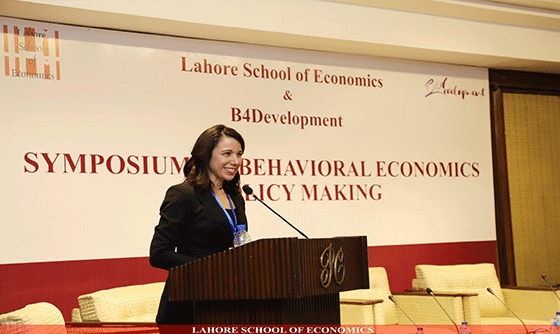
Fadi Makki, Founder of Nudge Lebanon, made the introduction for the Symposium in his capacity as the Head of
B4Development. He
appreciated the growth in the field of Behavioral Economics and credited it to the
increasing realism in the discipline due to "nudging"
rather than enforcement of public policy. He expressed
hope that practitioners and scholars would form a community and gather annually
for this Symposium in the
future for groundbreaking progress.
‘Providing information does not always work, financial incentives are not be sustainable. Behavioral nudges
can be the complementary tool
to steer people in the right direction', Mr. Maki explaining the concept of
nudge and behavioral insights at the Symposium.
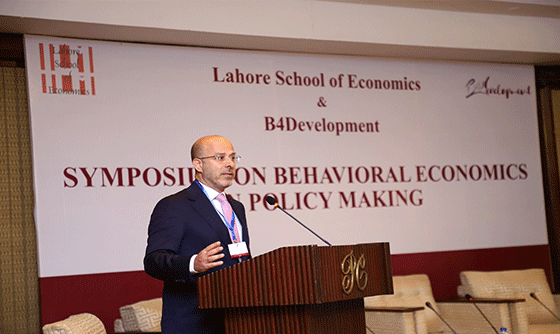
Session 1 of the symposium was chaired by Mujtaba Piracha, Additional Chief Secretary, Services Economy,
Government of Punjab with
Moderator Umar Taj, Research Fellow in Behavioral Science at Warwick Business
School.

James Vancel, Busara Centre for Behavioral Economics and Umar Taj, London School of Economics (LSE)
summarized key successes
of behavioral interventions in improving tax compliance around the world. James
Vancel explained that 'the underlying motivator is an
individual's perception of self-compared to their
peers.'
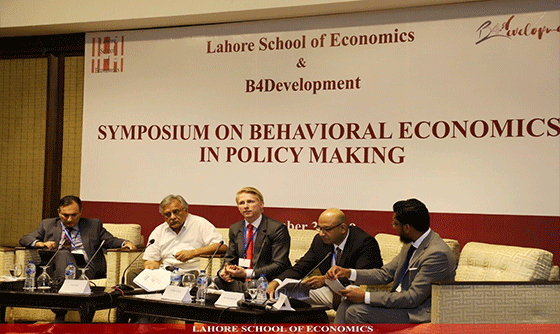
James Vancel, CEO of the Busara Center for Behavioral Economics, gave a cross country examination of
compliance with policies
and the behavioral components which were successful or unsuccessful in the
implementation of these policies.
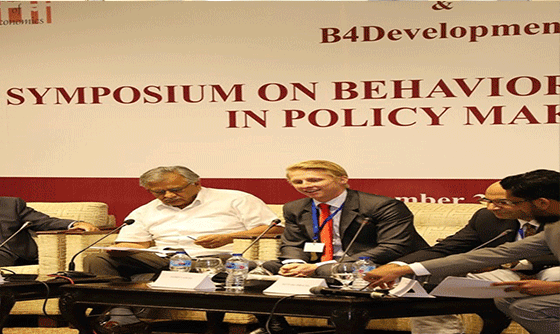
Dr. Ijaz Nabi, Country Director at International Growth Centre, made a special mention of the FBR's expertise
at collection of data and
lauded their initiative to combine it with the National Database on Pakistan's
population in their effort to increase revenue collection.
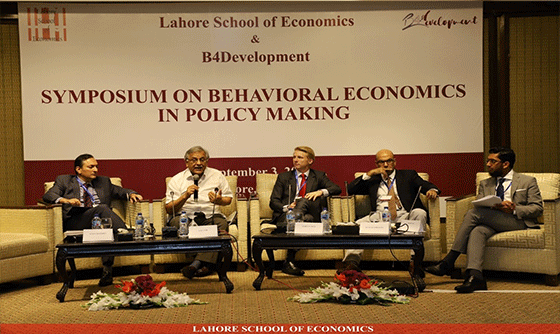
Dr. Azam Chaudhry, Dean of Economics at Lahore School of Economics, indicated Public and Private Sectors
where behavioral policy
interventions would be most effective and needed attention in Pakistan's context in
his wittily titled speech "Nudging Pakistan Forward".
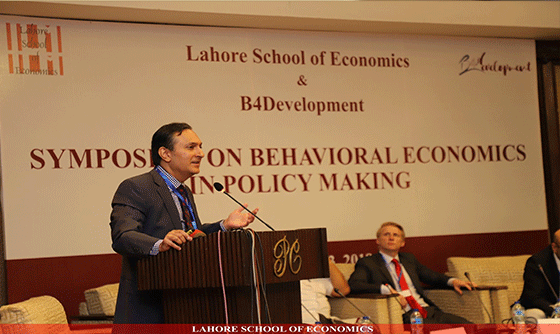
Second panel of "Symposium on Behavioral Economics in Policy Making"
was all about the government - how to 'nudge' the 'nudgers' chaired by Makhdum Hashim Bakht, Provincial
Finance Minister of Punjab.
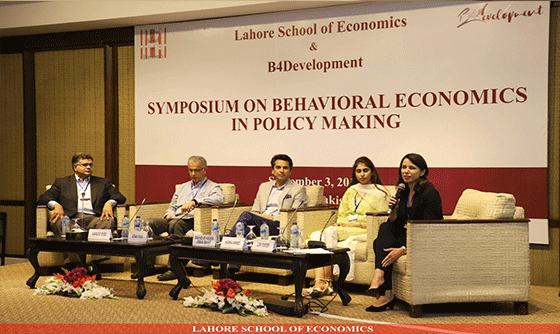
Dr. Adnan Qadir Khan, Professor in Practice by School of Public Policy at London School of Economics and
co-founder of CERP,
directed the discussion by asking fundamental questions about the issues faced and the
role of "nudging" in implemented behavioral
policy. He insisted that "nudging" was not a "silver bullet";
rather, it was a specific tool to run trial in tailored situations.
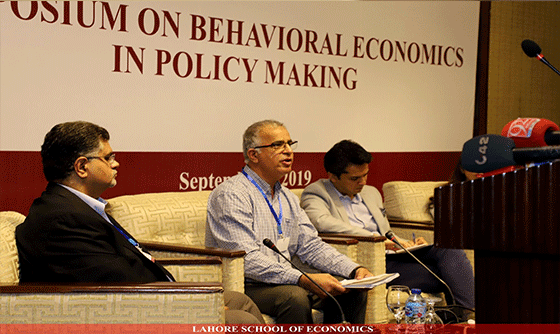
Maroof Syed, President & CEO of CERP and Senior Fellow and Advisor at Harvard’s Evidence for Policy Design,
addressed the
specific interventions in the tax collection sector by offering examples and highlighted the
role of "nudging" through help from local
Economic Think-Tanks. He indicated the partnership of private
research with public offices to enhance performance.
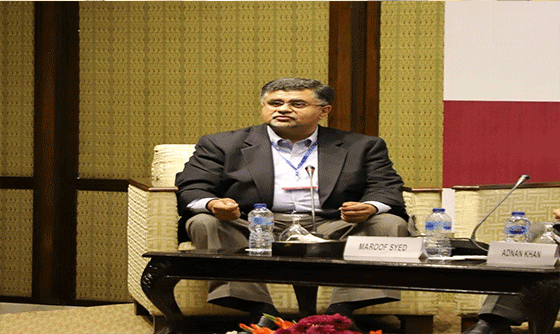
Dr. Hamna Ahmed, Assistant Professor at Lahore School of Economics and Researcher at CREB, used
self-conducted case studies
to state the realities of applied behavioral policy. Her talk complimented the
earlier discussions by concluding that behavioral economics
help economic policy become more meaningful. Dr.
Ahmed shared her insights from her research to improve accountability among
community organizations over
Pakistan. Recognizing high performing organizations among their peers, improves their governance
and makes
them more inclusive. Recognition matters for improving accountability!
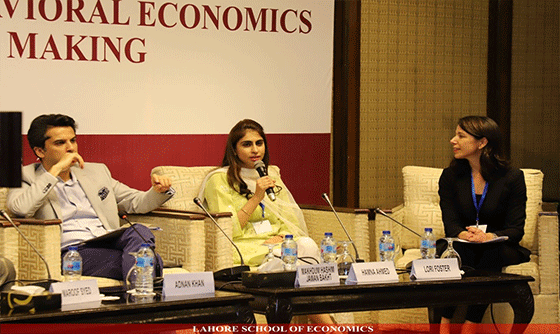
Finance Minister of the Government of Punjab, Makhdum Hashim Jawan Bakht, acknowledged the trend of involving
behavioral policy
design in Punjab's governing decisions. He mentioned the creation of a special committee
to "take a spacial view" of policy in Punjab
with attention to the economic and behavioral insights.
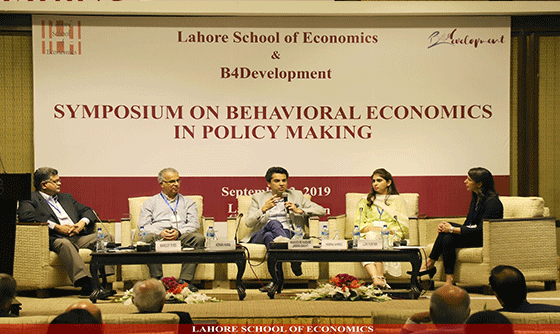
The Round Table addressed Capacity building in behavioral insights. It was a discussion regarding future
policy and the development of
behavioral economics discipline.
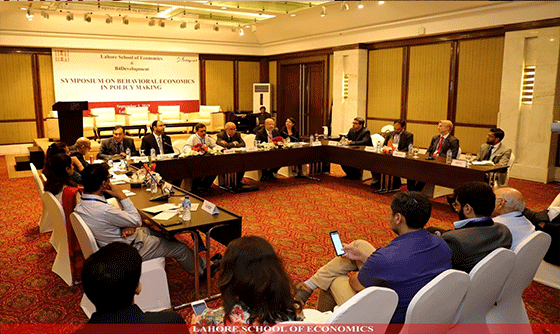
 People
People